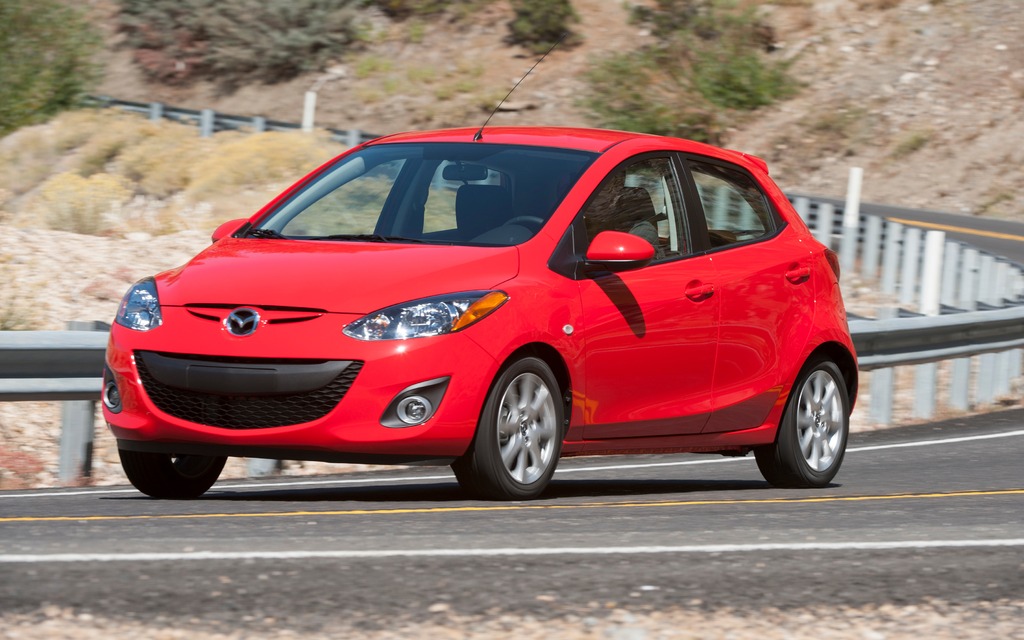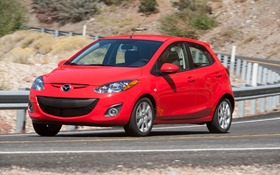2014 Mazda2: Living in the Shadow

| Strong points |
|
|---|---|
| Weak points |
|
After a few weeks of test driving various fuel-hungry vehicles, I was very pleased to take the wheel of a Mazda2 and reduce—albeit for just a week—my gas spending. I obviously knew that this would involve sacrificing on space, both in the passenger compartment and in the trunk, in addition to luxury, but that’s the price you have to pay when you drive a sub-compact.
Since its debut in 2011, the Mazda2 has attracted a lot of fans. Yet, it’s not exactly Mazda’s top seller. This title goes hands-down to the Mazda3, which no doubt steals a lot of buyers away from the Mazda2. The smaller of the two has also earned third place in its category, just behind the Nissan Versa and Hyundai Accent/Kia Rondo duo. It seems that Mazda’s signature driving pleasure is not as important in this segment, where equipment and price trump all.
- Also: Mazda2 EV and Mazda3 Hybrid: The Future According to Mazda
- Also: Mazda2 vs. Chevrolet Sonic: Two subcompacts go head to head
Wagon-inspired
Unlike some of its rivals that are offered in a variety of configurations, the Mazda2 only comes as a wagon-inspired hatchback. In other words, there is no four-door sedan. The Mazda2 hasn’t changed a bit for 2014 and comes in GX and GS trims, with the latter offering more equipment. Other than its 15-inch wheels, as opposed to steel wheels, the GS doesn’t offer anything that makes it a significantly better choice, especially when you consider that it costs almost as much as a Mazda3 GX. For an ideal version, all you need to do is add air conditioning (which is optional) to the base trim.
Under its hood, the Mazda2 houses a 1.5-litre four-cylinder engine that produces 100 horsepower at 6,000 rpm and 98 lb.-ft. of torque. This energy is directed to the front wheels by way of a standard five-speed manual gearbox or an optional four-speed automatic. Overall, the output is similar to the Nissan Versa, but you get a bit more pep from the Honda Fit and especially the Hyundai Accent/Kia Rio, which are equipped with 138-hp four-cylinder engines. At least the Mazda2 is lighter than its rivals, which compensates for its lesser power to a certain extent.
But where the Mazda2 has an edge is in its design. Its five-door configuration lends the vehicle a more dynamic style (few compact sedans are actually attractive), while its rounded corners add character. It looks compact and agile. The Mazda2 GS is a little more extroverted with a spoiler on its roof, extended door sills and chrome exhaust tip.
Inside, it’s all about simplicity, as is the case in nearly all sub-compacts. At least you don’t have to worry about managing highly complicated multi-functional systems. The various controls are easy to understand and use. The dashboard is well laid out and the passenger compartment showcases excellent attention to detail, which is definitely not the case in some of its rivals, many of which look rather cheap. The steering wheel is satisfying to hold and the seats are comfortable. The Mazda2’s trunk, however, is not its most convincing asset. It offers about as much space as the Ford Fiesta, but many other competitors give you more. The luggage cover is handy for keeping prying eyes off your gear, but it can get in the way when you want to load larger items.
A skittish lass
On the highway, the Mazda2 is nervous and pleasant to drive. Since it’s light, the car is agile and you get the sense that you can weave nimbly anywhere you want. The perfect car for the concrete jungle. Parking is actually fun. Its power is decent, but the manual gearbox does a better job using the available power. You get the sense that you have more control over the speed. Despite its size and power, this car is fun to drive and its handling is much more inspired than that of its rivals. This is where Mazda really scores points. The body is very rigid and the suspension does a terrific job managing weight transfer.
It was bitterly cold when I tested the Mazda2 and I discovered that my test model was not happy when the mercury dipped below -25°C. The suspension (especially in the rear) cracked whenever there was a big bump, which became irritating over time. As soon as the weather improved, however, the cracking stopped. I did some research on the topic and found that several other drivers have encountered the same problem. It goes without saying that the cold weather also affected the car’s fuel economy. I calculated an average of nearly 8 L/100 km, but it’s hardly the vehicle’s fault, given the circumstances.
Life for the Mazda2 must be tough, living in the shadow of the Mazda3. Hopefully the next Mazda2 will come with all the same technologies as the Mazda3 and Mazda6, as this would make it a lot more competitive.











